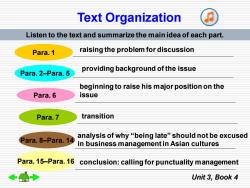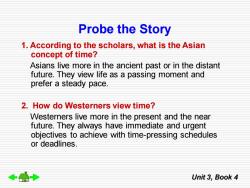《大学英语精读》课程教学资源(PPT课件)综合英语教程第三版 Unit 3, Book 4 Part I Reading and Language Activities Part II Reading and Language

Part Il >Reading and Language Activities Unit 3,Book 4
Part II Reading and Language Activities Unit 3, Book 4

Beadig and Language Activities Pre-reading Task Comprehension Work Language Work Unit 3,Book 4 Return to Menu
Pre-reading Task Comprehension Work Language Work Reading and Language Activities Unit 3, Book 4 Return to Menu

Fre-fcectogtes Discuss the following questions. Have you ever been late for class?What excuses did you give for your lateness? Why is punctuality a necessity in all public affairs in a civilized society? Have you ever noticed the difference in people's attitude toward the keeping of time in the rural and urban areas? Suggested Points Click Here Unit 3,Book 4
Discuss the following questions. Unit 3, Book 4 Have you ever been late for class? What excuses did you give for your lateness? Why is punctuality a necessity in all public affairs in a civilized society? Have you ever noticed the difference in people’s attitude toward the keeping of time in the rural and urban areas? Suggested Points

Suggested Points 1.The importance of punctuality a.efficiency (e.g.In factories or offices,some work may involve many people,so if one person is late,the work will have to be postponed.) b.respect (In many cultures,people are expected to be punctual since lateness means wasting other people's time.) c.competition (e.g.If one store opens and closes at a regular time,people will trust it.Otherwise,customers will be doubtful about its discipline or quality.) d.order(Punctuality certainly is a very important discipline in most workplaces.Otherwise,companies, schools,and offices would be in chaos.) Unit 3,Book 4
Unit 3, Book 4 Suggested Points 1.The importance of punctuality a. efficiency (e.g. In factories or offices, some work may involve many people, so if one person is late, the work will have to be postponed.) b. respect (In many cultures, people are expected to be punctual since lateness means wasting other people’s time.) c. competition (e.g. If one store opens and closes at a regular time, people will trust it. Otherwise, customers will be doubtful about its discipline or quality.) d. order (Punctuality certainly is a very important discipline in most workplaces. Otherwise, companies, schools, and offices would be in chaos.)

2.Urban/rural differences Urban:more punctual Possible reasons:more cooperation,higher efficiency, intense competition,more complex human relationship, etc.(Basically,most jobs in cities are concerned with human relationships;therefore,people have to obey the public rules in order to gain social or economic success.) Rural:less punctual Possible reasons:less competitive or urgent,less sophisticated human relationship,etc. Unit 3,Book 4
Unit 3, Book 4 2. Urban/rural differences Urban: more punctual Possible reasons: more cooperation, higher efficiency, intense competition, more complex human relationship, etc. (Basically, most jobs in cities are concerned with human relationships; therefore, people have to obey the public rules in order to gain social or economic success.) Rural: less punctual Possible reasons: less competitive or urgent, less sophisticated human relationship, etc

Couprctcustortot ▣Text Organization ▣Probe the Story Creative Writing and Speaking ▣Difficult Sentences Unit 3,Book 4
Text Organization Probe the Story Creative Writing and Speaking Difficult Sentences Unit 3, Book 4

Text Organization Listen to the text and summarize the main idea of each part. Para.1 raising the problem for discussion Para.2-Para.5 providing background of the issue beginning to raise his major position on the Para.6 issue Para.7 transition analysis of why"being late"should not be excused Para.8-Para.14 in business management in Asian cultures Para.15-Para.16 conclusion:calling for punctuality management Unit 3,Book 4
Unit 3, Book 4 Text Organization Listen to the text and summarize the main idea of each part. Para. 1 Para. 2–Para. 5 Para. 6 Para. 7 Para. 8–Para. 14 raising the problem for discussion providing background of the issue beginning to raise his major position on the issue Para. 15–Para. 16 conclusion: calling for punctuality management analysis of why “being late” should not be excused in business management in Asian cultures transition

Probe the Story 1.According to the scholars,what is the Asian concept of time? Asians live more in the ancient past or in the distant future.They view life as a passing moment and prefer a steady pace. 2.How do Westerners view time? Westerners live more in the present and the near future.They always have immediate and urgent objectives to achieve with time-pressing schedules or deadlines. Unit 3,Book 4
Probe the Story Unit 3, Book 4 1. According to the scholars, what is the Asian concept of time? Asians live more in the ancient past or in the distant future. They view life as a passing moment and prefer a steady pace. 2. How do Westerners view time? Westerners live more in the present and the near future. They always have immediate and urgent objectives to achieve with time-pressing schedules or deadlines

3.What figure of speech does the writer use to illustrate the cultural difference regarding the concept of time? The writer uses a number of metaphors to make his point:"neurotic slavery"indicates being abnormally bound to tight schedules;"the sense of zero gravity"refers to the freedom of spending one's time at will;one's life course is compared to "a long journey";and "the next hill"suggests something within reach. Unit 3,Book 4
Unit 3, Book 4 3. What figure of speech does the writer use to illustrate the cultural difference regarding the concept of time? The writer uses a number of metaphors to make his point: "neurotic slavery" indicates being abnormally bound to tight schedules; "the sense of zero gravity" refers to the freedom of spending one's time at will; one's life course is compared to "a long journey"; and "the next hill" suggests something within reach

4.Does the writer agree to the claim that unpunctuality is related to a certain cultural outlook?Why? The writer does not agree to the claim.He thinks that whether a person is punctual or not has nothing to do with his cultural outlook, because observance of time and philosophical perception of time are two different things. Unit 3,Book 4
Unit 3, Book 4 4. Does the writer agree to the claim that unpunctuality is related to a certain cultural outlook? Why? The writer does not agree to the claim. He thinks that whether a person is punctual or not has nothing to do with his cultural outlook, because observance of time and philosophical perception of time are two different things
按次数下载不扣除下载券;
注册用户24小时内重复下载只扣除一次;
顺序:VIP每日次数-->可用次数-->下载券;
- 《大学英语精读》课程教学资源(PPT课件)综合英语教程第三版 Unit 3, Book 4 Part I Communicative Activities.ppt
- 《英语视听》课程教学资源(参考资料)《实习医生格蕾》第1-4季英文剧本 GREY'S ANATOMY S4.doc
- 《英语视听》课程教学资源(参考资料)《实习医生格蕾》第1-4季英文剧本 GREY'S ANATOMY S3.doc
- 《英语视听》课程教学资源(参考资料)《实习医生格蕾》第1-4季英文剧本 GREY'S ANATOMY S2.doc
- 《英语视听》课程教学资源(参考资料)《实习医生格蕾》第1-4季英文剧本 GREY'S ANATOMY S1.doc
- 《英语视听》课程教学资源(参考资料)《实习医生格蕾》第3季英文剧本 GREY'S ANATOMY.doc
- 《英语视听》课程教学资源(参考资料)四级听力经典陈述(for teachers).doc
- 《英语视听》课程教学资源(参考资料)《实习医生格蕾》词汇.doc
- 《英语视听》课程教学资源(PPT课件)Step By Step 3000 book 3 unit 4.ppt
- 《英语视听》课程教学资源(PPT课件)Step By Step 3000 book 3 unit 3.ppt
- 《英语视听》课程教学资源(PPT课件)Step By Step 3000 book 2 Unit 9 Disasters.ppt
- 《英语视听》课程教学资源(PPT课件)Step By Step 3000 book 2 Unit 8 Everybody can help the environment.ppt
- 《英语视听》课程教学资源(PPT课件)Step By Step 3000 book 2 Unit 3 All Can Succeed.ppt
- 《英语视听》课程教学资源(PPT课件)Step By Step 3000 book 2 Unit 4 Getting Ready for the Future Career.ppt
- 《英语视听》课程教学资源(PPT课件)Step By Step 3000 book 2 Unit 7 Leisure Time.ppt
- 《英语视听》课程教学资源(PPT课件)Step By Step 3000 book 2 Unit 6 It’s Great to Be a Champion.ppt
- 《英语视听》课程教学资源(PPT课件)Step By Step 3000 book 2 Unit 2 Shaping and Reshaping Personality.ppt
- 《英语视听》课程教学资源(PPT课件)Step By Step 3000 book 2 Unit 1 Happy Family Life.ppt
- 《英语视听》课程教学资源(PPT课件)Step By Step 3000 book 2 Unit 5 Creative Minds.ppt
- 《英语视听》课程教学资源(教案讲义)英语视听教案9-10.doc
- 《大学英语精读》课程教学资源(PPT课件)综合英语教程第三版 Unit 3, Book 4 Part III Extended Activities.ppt
- 《大学英语精读》课程教学资源(PPT课件)综合英语教程第三版 Unit 4, Book 4 Part I Communicative Activities.ppt
- 《大学英语精读》课程教学资源(学习资料)虚拟语气.pdf
- 《大学英语精读》课程教学资源(学习资料)动词、时态和语态.pdf
- 《大学英语精读》课程教学资源(学习资料)一致关系.pdf
- 《大学英语精读》课程教学资源(学习资料)状语从句.pdf
- 《大学英语精读》课程教学资源(学习资料)名词性从句.pdf
- 《大学英语精读》课程教学资源(学习资料)定语从句.pdf
- 《大学英语精读》课程教学资源(学习资料)非谓语动词(非限定动词).pdf
- 《大学英语精读》课程教学资源(学习资料)情态动词.pdf
- 《大学英语精读》课程教学资源(学习资料)形容词和副词.pdf
- 《大学英语精读》课程教学资源(学习资料)名词.pdf
- 《大学英语精读》课程教学资源(语法练习)As.doc
- 《大学英语精读》课程教学资源(语法练习)It.doc
- 《大学英语精读》课程教学资源(语法练习)That.doc
- 《大学英语精读》课程教学资源(语法练习)代词.doc
- 《大学英语精读》课程教学资源(语法练习)倒装句.doc
- 《大学英语精读》课程教学资源(语法练习)定语从句.doc
- 《大学英语精读》课程教学资源(语法练习)动名词.doc
- 《大学英语精读》课程教学资源(语法练习)动词与动词词组.doc
